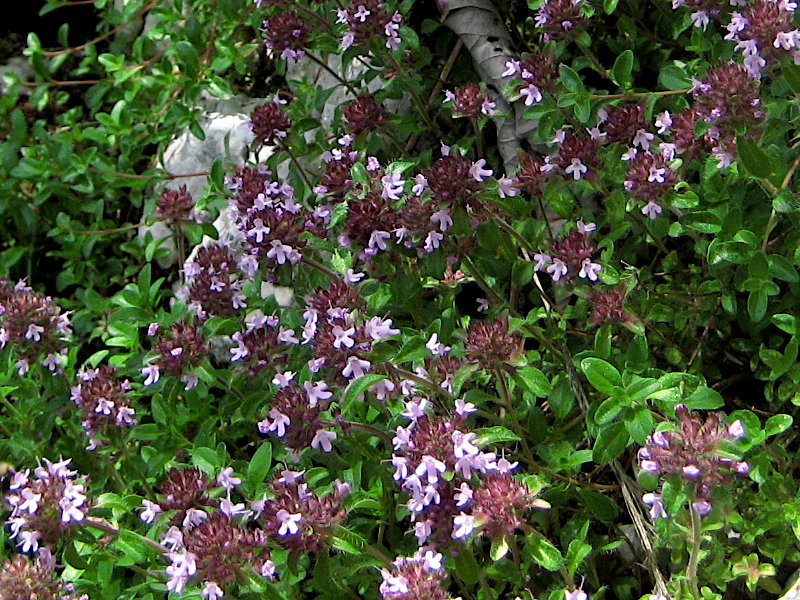Wise Mind Herbs
Evidence-based Herbal Healing
The information on this page has been prepared with reference to published scientific literature, not by a medically qualified expert. It is not medical advice. Any decision to use a supplement or herb-based product is your responsibility. Consult a suitably qualified medical professional, especially if you have underlying conditions. Remember, nothing is for everyone, and not everything sold is what it claims to be. Some things work for some people, some of the time.
Thyme - Thymus vulgaris
Thyme (Thymus vulgaris L.) is an aromatic perennial herb belonging to the Lamiaceae family. Other common species include Thymus serpyllum (wild thyme), Thymus zygis (Spanish thyme), and Thymus citriodorus (lemon thyme). Thymus vulgaris is sometimes confused with Thymbra spicata (Mediterranean thyme) or Coleus amboinicus (Cuban oregano/Spanish thyme), which despite similar names, represent different plants with distinct chemical compositions.

Image source and license: https://commons.wikimedia.org/wiki/File:Materina_du%C5%A1ica_(Thymus_vulgaris)_-_Komar%C4%8Da,_NW_Slovenia.jpg.
Modified by Peter Jorgensen.
Active Compounds
The therapeutic properties of thyme are primarily attributed to its essential oil, which contains thymol (20-54%) and carvacrol (1-10%) as major components. Other bioactive compounds include flavonoids (luteolin, apigenin), phenolic acids (rosmarinic acid, caffeic acid), and triterpenes. The composition varies significantly depending on chemotype, geographical origin, harvest time, and extraction method.
Evidence-Based Health Benefits
According to peer-reviewed scientific literature, thyme has demonstrated the following properties:
- Antimicrobial activity: Effective against various bacteria (including multidrug-resistant strains), fungi, and viruses. Particularly potent against respiratory and gastrointestinal pathogens.
- Antioxidant effects: Scavenges free radicals and reduces oxidative stress markers in both in vitro and in vivo studies.
- Anti-inflammatory properties: Inhibits inflammatory mediators and cytokines in various experimental models.
- Expectorant and bronchodilatory effects: Relaxes bronchial smooth muscles and promotes mucus clearance.
- Digestive benefits: Stimulates digestive enzyme secretion and reduces gastrointestinal spasms.
- Immunomodulatory activity: Enhances innate and adaptive immune responses.
Conditions With Supporting Evidence
- Respiratory infections: Acute bronchitis, common cold, pharyngitis, sinusitis
- Digestive disorders: Dyspepsia, irritable bowel syndrome, mild gastrointestinal infections
- Oral conditions: Gingivitis, oral candidiasis, halitosis
- Skin conditions: Minor wounds, acne, fungal infections
- Urinary tract infections (adjuvant therapy)
It's important to note that while thyme shows promise for these conditions, it's generally used as a complementary approach rather than a sole treatment, particularly for more serious conditions.
Recommended Dosages
Standardization varies across preparations, making dosage recommendations challenging. Generally accepted ranges include:
- Dried herb: 1-4g daily, divided into 2-3 doses
- Fluid extract (1:1): 1-2ml, three times daily
- Essential oil (standardized to contain 20-54% thymol): 0.03-0.3ml daily, highly diluted and not for direct consumption
- Tea infusion: 1-2g dried herb steeped in 150ml hot water, up to three times daily
- Commercial preparations: Follow manufacturer's instructions (typically standardized to thymol content)
Side Effects and Disbenefits
When used in culinary amounts or as directed medicinally, thyme is generally recognized as safe (GRAS). However, potential adverse effects include:
- Allergic reactions: Contact dermatitis, respiratory allergies (particularly with essential oil)
- Gastrointestinal discomfort: Nausea, vomiting, or diarrhea with high doses
- Anticoagulant effects: May potentiate anti-clotting medications
- Hormonal effects: Weak estrogenic activity in some preparations
- Irritation of mucous membranes with direct application of essential oil
- Potential toxicity with undiluted essential oil consumption (not recommended)
Contraindications include pregnancy (especially essential oil), hormone-sensitive conditions, scheduled surgery, severe bleeding disorders, and hypersensitivity to plants in the Lamiaceae family.
High-Dose Studies
Research on doses exceeding the recommended ranges is limited. Animal studies suggest potential hepatotoxicity and nephrotoxicity at very high concentrations of thyme essential oil (>500mg/kg body weight), but these concentrations far exceed typical therapeutic doses. Most clinical studies have adhered to traditional dosage ranges, leaving a significant knowledge gap regarding higher-dose effects in humans. More comprehensive dose-escalation studies are required to establish clearer upper safety thresholds.
Conclusion
Thyme demonstrates significant potential as a complementary therapeutic agent, particularly for respiratory and minor infectious conditions. Its proven antimicrobial, anti-inflammatory, and antioxidant properties support its traditional uses. However, more robust clinical trials with standardized preparations are needed to establish definitive efficacy, optimal dosing regimens, and safety profiles for specific conditions. Given its generally favorable safety profile at recommended doses, thyme remains a promising candidate for further research and development in integrative medicine.
References
Balaky, S. T. J. (2024). Anti H. pylori, anti-secretory and gastroprotective effects of Thymus vulgaris on ethanol-induced gastric ulcer in Sprague Dawley rats. Plos one, 19(1), e0287569.
Borugă, O., Jianu, C., Mişcă, C., Goleţ, I., Gruia, A. T., & Horhat, F. G. (2014). Thymus vulgaris essential oil: chemical composition and antimicrobial activity. Journal of medicine and life, 7(Spec Iss 3), 56.
Fachini-Queiroz, F. C., Kummer, R., Estevao-Silva, C. F., Carvalho, M. D. D. B., Cunha, J. M., Grespan, R., ... & Cuman, R. K. N. (2012). Effects of thymol and carvacrol, constituents of Thymus vulgaris L. essential oil, on the inflammatory response. Evidence‐Based Complementary and Alternative Medicine, 2012(1), 657026.
Fani, M., & Kohanteb, J. (2017). In vitro antimicrobial activity of Thymus vulgaris essential oil against major oral pathogens. Journal of evidence-based complementary & alternative medicine, 22(4), 660-666.
Haque, M. R., Ansari, S. H., Najmi, A. K., & Ahmad, M. A. (2014). Monoterpen
Mohammadi, A., Mahjoub, S., Ghafarzadegan, K., & Nouri, H. R. (2018). Immunomodulatory effects of Thymol through modulation of redox status and trace element content in experimental model of asthma. Biomedicine & pharmacotherapy, 105, 856-861.
Patil, S. M., Ramu, R., Shirahatti, P. S., Shivamallu, C., & Amachawadi, R. G. (2021). A systematic review on ethnopharmacology, phytochemistry and pharmacological aspects of Thymus vulgaris Linn. Heliyon, 7(5).